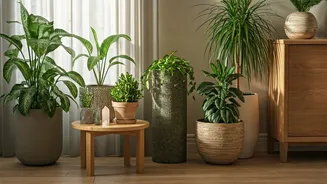Understanding Vastu Doshas
Vastu Shastra, an ancient Indian architectural science, emphasizes the significance of aligning a building with the energies of nature to ensure harmony
and well-being. 'Doshas' in Vastu refer to any irregularities in the construction or arrangement of a home that disrupt the flow of positive energy. These can manifest as imbalances in the five elements – earth, water, fire, air, and space – leading to negative impacts on health, wealth, and relationships. It’s crucial to identify these doshas to rectify them and restore the home's positive energy. This section provides an overview of what constitutes a Vastu dosha and how it affects the overall environment of a home. It sets the stage for understanding the remedies that will be discussed in the following sections.
Entrance Door Essentials
The entrance door is the primary gateway for energy entering a home; therefore, it’s imperative it adheres to Vastu principles. Ensure the main door faces east, north, or northeast as these directions are considered auspicious. Avoid any obstacles in front of the door, such as trees or electrical poles, which can obstruct the free flow of energy. A well-lit and welcoming entrance can significantly enhance positive energy. Consider keeping a clean and organized space near the entrance, and display a welcoming nameplate, which is crucial. Placing a Swastika symbol or a statue of Ganesha at the entrance is also recommended to invite positive energy and safeguard the home from negative influences. Remember to keep the door clean and free from any damage.
Addressing Room Placement
Proper placement of rooms according to Vastu principles is crucial for balancing energies within a home. The master bedroom should be in the southwest direction, promoting restful sleep and a stronger relationship between the couple. Children's rooms should be in the west or northwest to encourage learning and growth. The kitchen is best positioned in the southeast, where the fire element is balanced. The puja room (prayer room) should be in the northeast, the most sacred area of the house. Avoid placing the kitchen and the bathroom adjacent to each other as they have contrasting energies. The living room can be in the east or north, welcoming positive energy, and ensure that the furniture is arranged so as to facilitate easy movement throughout the space.
Kitchen Vastu Tips
The kitchen is considered a place of fire and nourishment, so its Vastu is extremely vital. Ensure the kitchen is in the southeast direction to maintain the balance of the fire element. The cooking platform should ideally face east to ensure the cook’s face faces east. Avoid placing the stove directly in front of the main door, as this can lead to conflicts. Keep the kitchen clean and organized at all times to prevent the accumulation of negative energy. The placement of the sink should be away from the stove to avoid conflicting energies. It is always wise to ensure that the gas stove is always kept clean and is never left unattended when in use. Additionally, ensure proper ventilation is present to circulate fresh air and eliminate any negative energies that might accumulate.
Correcting Bedroom Vastu
The bedroom should be a sanctuary of rest, and its Vastu is crucial for peaceful sleep and balanced relationships. The master bedroom should be located in the southwest direction for restful sleep and enhanced marital harmony. The bed should be placed with the headboard towards the south or west, avoiding the east or north. Avoid placing a bed directly opposite the door, and ensure that the bedroom is well-lit and well-ventilated. Mirrors should not be placed directly opposite the bed as it can cause disturbance in sleep. The use of soft colours and calming decor will contribute to a peaceful atmosphere. A well-organized and clutter-free bedroom will promote relaxation and a positive environment, fostering better mental and physical well-being.
Enhancing Positive Energy
Beyond structural adjustments, certain practices can enhance positive energy flow. Keeping the home clean and organized is a fundamental step, clearing stagnant energy. Regularly ventilating the house by opening windows and doors helps to circulate fresh air, removing negative vibes. Incense, lamps, or candles can purify the environment by burning them. Decorate the home with positive imagery such as paintings depicting nature or deities, and the placement of indoor plants, especially those that purify the air, will bring in positive energy. Using natural light as much as possible, while also ensuring proper lighting in all parts of the house, contributes to a balanced and inviting atmosphere. Regular chanting of mantras or playing soothing music can also uplift the environment, fostering a sense of peace.
Water and Drainage
The flow of water in a home directly influences the flow of prosperity and well-being. Proper water management is essential for Vastu compliance. Ensure that the water drains from the north or east direction, avoiding the south or west. Avoid any water leakage in the house, as it signifies a loss of wealth. Place a water fountain or a small aquarium in the northeast direction of the house to enhance positivity. Ensure the proper placement of the water tanks, borewells, and other water storage areas in the appropriate directions. Keeping the area around water sources clean and well-maintained is also important. These practices ensure the continuous flow of positive energy in the home, contributing to overall prosperity and well-being.
Addressing Toilet Placement
The positioning of toilets is critical in Vastu as they influence the energy of the home. According to Vastu, toilets should ideally be located in the west or northwest direction. Avoid placing the toilet in the northeast direction, as it can bring negative energy. Ensure that the toilet door is always closed to prevent the negative energy from spreading. The toilet should be clean and well-maintained to avoid any health issues. Using air fresheners and maintaining proper ventilation will help keep the area fresh and the energy positive. The toilet should not be located adjacent to the kitchen or the puja room as it can cause disruptions to the positive energies of those spaces.
Simple Remedies and Practices
Implementing specific remedies can counteract Vastu doshas and invite positivity. Placing salt in the corners of rooms to absorb negativity is a simple yet effective practice. Burning camphor or incense regularly can purify the air and remove negative vibrations. Decorating the home with vibrant colours and avoiding dull hues can uplift the mood and energy. Regularly cleaning the house, especially the corners, where negativity tends to accumulate, is important. You can also place plants such as Tulsi or bamboo in the house, which are believed to bring good luck. Praying and meditating regularly in the house contributes to a positive environment. These simple steps, when integrated into daily life, can help balance the energy flow and remove Vastu doshas.














